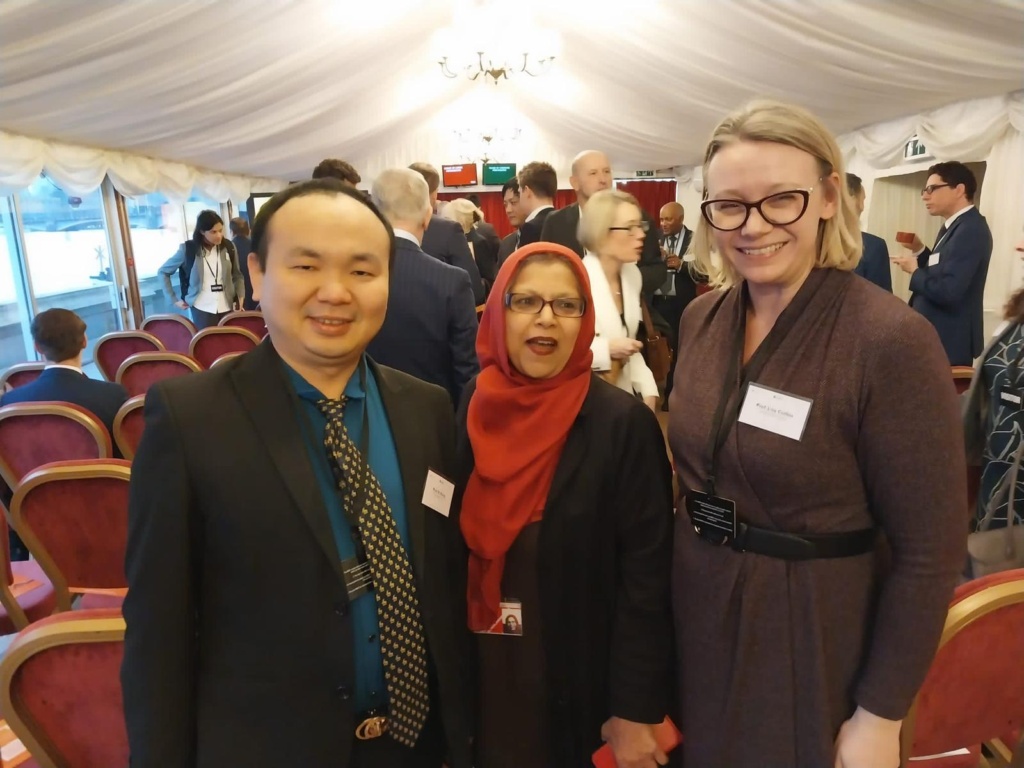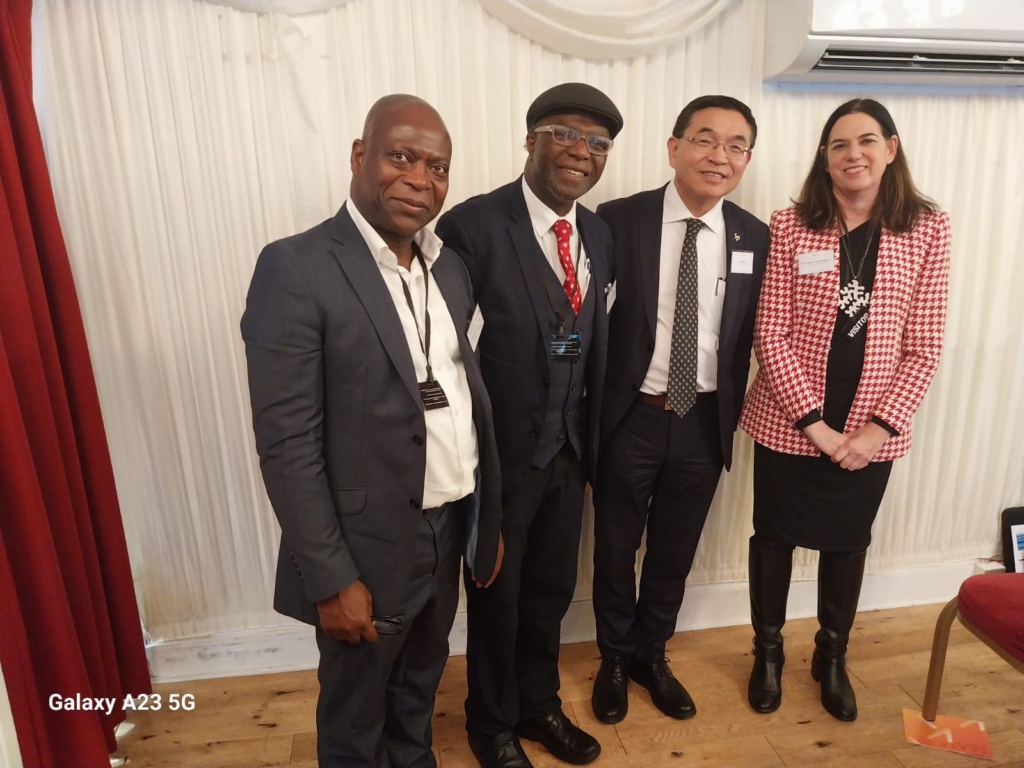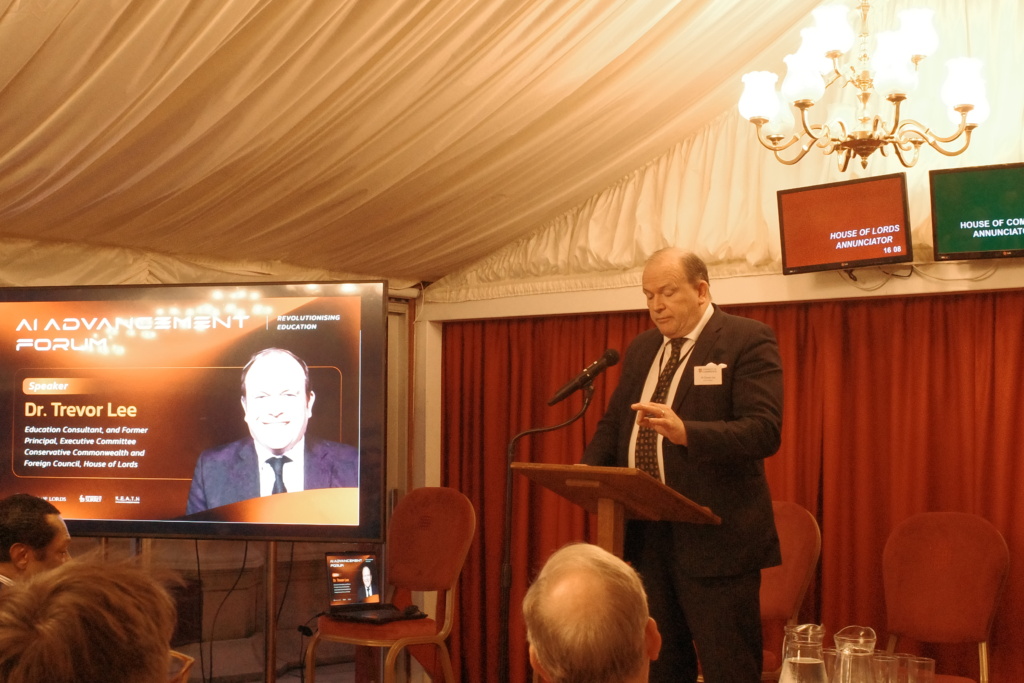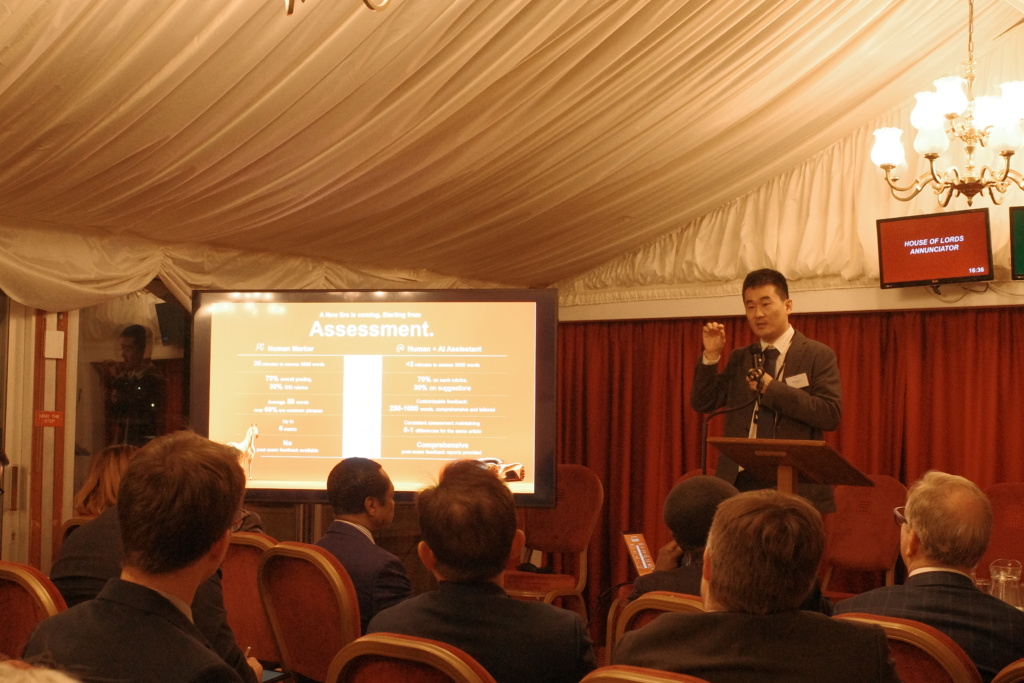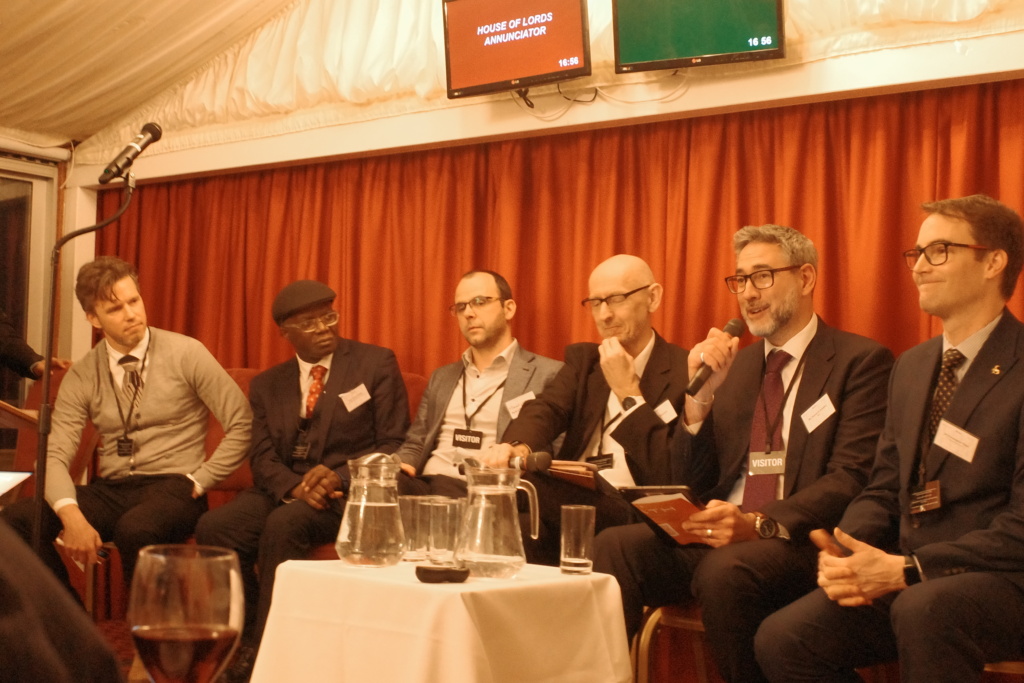
In a historic first, the hallowed halls of the UK Parliament echoed with the buzz of educational reform on December 15th, 2023. Titled “AI Advancement Forum” to discuss Educational Evolution in the Halls of Power: Innovative AI Assessment Platform Launched at the Houses of Parliament,” the event saw pioneers, or leaders in education convene to deliberate on the revolutionary KEATH.ai platform and its potential to transform student assessment and overall learner experience.
(Interested institutions may AI-learning@ExcellenceInEducation.org.uk for more information and arrange a demonstration)
Professor Chris Imafidon, a multi-award-winning scholar; and Wall Street Journal best selling author – one of the panellists at the event reviews discussions and the future of education in an AI age.
PROGRAMMES
“This (2023) is the year of AI”, said University of Surrey’s President and Vice-Chancellor Professor Max Lu. “How are we going to push ourselves to measure assessment and learning at a higher level?” Alluding to KEATH.ai’s launch, he asked the audience of global educational organisations.
With a live demonstration to the audience, KEATH CEO Joey Lin, formally introduced KEATH.ai as a groundbreaking AI tool in educational assessment evaluation software. After years of research and development, KEATH.ai’s software guarantees consistent and precise student feedback, unilaterally saving teachers’ time. Its proprietary technology ensures a high degree of accuracy of approximately 95%, which can be achieved when compared to human markers. Surrey’s Associate Vice President and KEATH’s Managing Director, Professor Yu, elaborated that KEATH’s technology “will not replace humans, but act as a copilot, a digital assistant”.
PIONEERS
It commenced with the University of Surrey Vice President (Global) Patrick Degg proclaiming, ‘AI can, and inescapably will, change the educational landscape.’ The forum featured panels of esteemed speakers from academia, and both the private and public sector, as well as prominent attendees representing multiple universities, from Oxford University to Columbia University; and embassy officials spanning several continents, from Africa, the Middle East, and Europe.
This set the stage for a day where global educational leaders explored the synergy between education and AI, culminating in the unveiling of KEATH.ai, a groundbreaking EdTech tool; where its CEO, Joey Lin, proclaimed, “Last December, students got ChatGPT; this December, teachers get KEATH.ai”. Lin also likened generative AI’s impact on education to the shift from horses to cars, with multiple universities piloting their technology and driving further data collection.
PROGRESS
The Lord Taylor of Warwick spoke positively about the new era of AI; and about bridging the gap between the ” have nots” and “have yachts”, and also mentioned Elon Musk’s AI alarmism, cautiously preferring to adopt a ‘glass half full’ ideology. Lord Taylor emphasised the importance of ensuring that AI’s power is democratised, saying, “This is imperative for the education sector, which has arguably been affected by social factors since its inception.”
PROSPECTS
BBC’s Executive Product Manager, Jon Howard, hypothesised what the future of education may look like “adaptive technologies, adapting the content to things that you like…with auto(matic)-grading is a big part of that”. KEATH.ai’s innovation received positive feedback from attending experts, including renowned UK education advisor, Dr. Trevor Lee, who remarked on its exceptional ease of use. “Teachers face immense personal pressure caused by marking overload, much of which amounts to many, many unpaid hours for work conducted in evenings and weekends. I estimate that 500 hours per year can realistically save many teachers’ time, by the judicious use of KEATH.ai, without compromising any quality”, said Lee.
De Montfort University’s Vice-Chancellor, Katie Normington stated AI must be embraced to go forward, but change is inevitable in this sector and assessment must adapt in a reflective tandem. Michael Luck, Deputy Vice-Chancellor of the University of Sussex, discussed the fear and excitement surrounding AI, with recent advancements in deep learning allowing for significant progress. He also reinforced the need for responsible governance.
Professor Chris Imafidon said “AI opens a new era of feedback to learners and scholars. The speed of marking essay-based exercise is incredible because 5,000 words in minutes, with detailed individualised comments. It means that lecturers can set diagnostic, formulative and related work without the fear of spending endless weeks marking them manually”.
UNESCO’s Mark West remarked, “We (UNESCO) have been adamant that the only way that we are going to get the sort of educational transition in an AI world is by bringing different voices together. And that’s what I have really witnessed today”.
FAST PACED
“AI does have its danger” stated Baroness Manzila Uddin, “leadership is really important and very salient when we define what AI is going to deliver us,” delivering a more cautionary stance to the governance of AI. She highlighted that AI will “transcend the current inequalities, the current skills gap, the current machination of those who are at the right end and those who are at the bottom.”
The centerpiece of the event was the unveiling of KEATH.ai, an innovative platform that utilizes machine learning to assess student project reports and research work. KEATH.ai boasts exceptional accuracy, surpassing 95% in benchmark tests against human markers. But its significance lies not just in its accuracy, but also in its ability to offer personalized feedback, identify strengths and weaknesses, and even suggest potential avenues for further research.
PEOPLE
Professors Max Lu, Chris Imafidon, and Lin Fu, leading lights in the field, shared their invaluable insights alongside KEATH.ai staff and Lord Taylor of Warwick, lending the gathering both academic rigor and political gravitas. The atmosphere crackled with a palpable sense of change, a glimpse into a future where artificial intelligence could reshape the very fabric of academia.
Professor Max Lu, renowned for his work in AI-powered curriculum development, set the stage by highlighting the limitations of traditional assessment methods. “Exams and papers often fail to capture the true scope of a student’s understanding,” he stated, “They struggle to assess creativity, critical thinking, and the nuanced application of knowledge.” This, he argued, is where AI shines.
Professor Lin Fu, a pioneer in AI-powered research evaluation, offered a glimpse into the future of academic scholarship. “Imagine a world where research papers are assessed not just for factual accuracy, but also for originality, impact, and potential real-world application,” she enthused. “AI can make this a reality, accelerating scientific progress and fostering groundbreaking discoveries.”
Professor Lu aptly termed KEATH.ai “a game-changer.” “This platform has the potential to revolutionize not just assessment, but the entire learning experience,” he declared. “By providing data-driven insights and tailored feedback, KEATH.ai can empower students to take ownership of their learning and reach their full potential.”
PARLIAMENT
However, concerns were also raised during the discussion. Lord Taylor of Warwick, a vocal advocate for human-centered education, cautioned against overreliance on AI. “While AI can be a valuable tool,” he emphasized, “it must never replace the irreplaceable role of human mentors and educators. The human touch, the guidance, and the inspiration offered by educators remain vital for nurturing well-rounded individuals.”
Professor Imafidon echoed this sentiment, urging caution regarding potential bias in AI algorithms. “We must ensure that AI assessment tools are developed with inclusivity and equity in mind,” he stressed. “Otherwise, we risk perpetuating existing inequalities and exacerbating existing biases.”
Despite these concerns, the overall sentiment at the event was one of cautious optimism. The “Educational Evolution in the Halls of Power” served as a powerful testament to the growing acceptance of AI in the field of education. With careful implementation and robust safeguards, AI assessment tools like KEATH.ai have the potential to democratize education, personalize learning, and unlock the full potential of every student. As Professor Lin aptly concluded, “This is not about replacing humans, but about augmenting them, creating a powerful synergy between human expertise and the precision of AI. Together, we can usher in a new era of education, one that is more equitable, efficient, and effective for all.”
The event at the Houses of Parliament marks a significant milestone in the evolving landscape of education. With AI taking center stage, the halls of power have become a testing ground for a future where technology and tradition seamlessly blend to create a brighter learning future for generations to come.
Professor Chris Imafidon, is a Wall Street Journal bestselling author, and Mentor to multi-millionaire tech entrepreneurs. He is a multi-Guinness World record holder; Internationally renowned adviser to monarchs, governments, presidents and corporate leaders; Coach to New York Times Bestellers and a Sunday Times Op-ed author. He is a 5X International bestselling author, and a celebrated royal biographer. His research and innovation have been recognized internationally, winning multiple awards in many continents across multiple disciplines and his mentees are global leaders in pioneers and also world record holders. He is an award winning chair of HM Queen Elizabeth’s Platinum Jubilee programme on STEM & Education. He recently chaired the Coronation series on Artificial Intelligence’s impact on education and has authored royal biographies. [Twitter (X) @ChrisImafidon; Instagram @CoImafidon, Linkedln and Facebook – ProfessorChrisImafidon]
Kindly follow us on twitter:@AfricanVoice2
